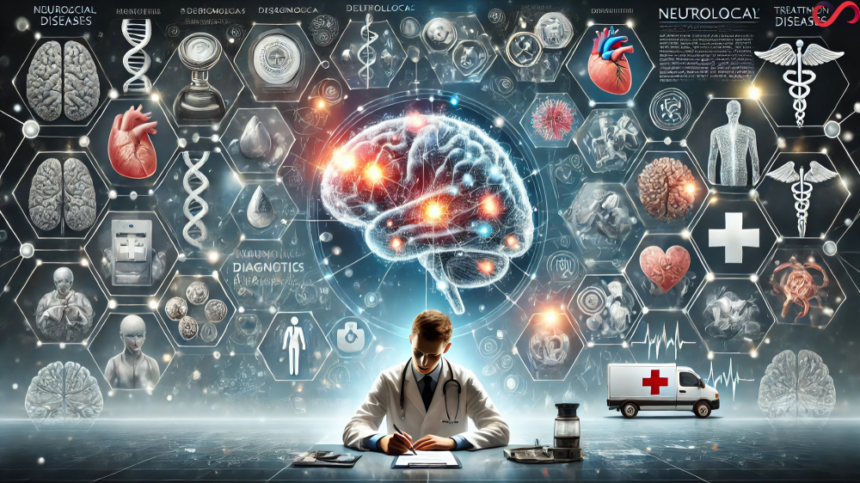Neurological diseases encompass a vast range of disorders that affect the nervous system, including the brain, spinal cord, and peripheral nerves. These conditions can have a profound impact on a person’s quality of life and can vary widely in terms of severity, symptoms, and treatment options. With the increasing prevalence of these diseases globally, it is essential to understand their nature, causes, diagnosis, and treatment options.
DoctorHub360.com stands as a leading resource for individuals seeking knowledge about neurological diseases, offering accurate and up-to-date information on these conditions. This article will provide an in-depth look into the most common neurological diseases, how they are diagnosed, available treatments, and how DoctorHub360.com plays a crucial role in helping people manage their conditions.
What are Neurological Diseases?
Neurological diseases refer to any disorder that affects the nervous system. This broad category includes diseases of the brain, spinal cord, and peripheral nerves. The nervous system controls everything from basic functions like breathing to complex processes like thinking and moving. As such, when something goes wrong in the nervous system, it can lead to a wide range of symptoms, some of which can be life-threatening.
The nervous system is divided into two main parts:
- Central Nervous System (CNS): This includes the brain and spinal cord.
- Peripheral Nervous System (PNS): This consists of the nerves outside the brain and spinal cord, including the sensory and motor nerves.
Types of Neurological Diseases
Neurological diseases are classified based on which part of the nervous system they affect. Some of the most common neurological conditions include:
1. Alzheimer’s Disease
Alzheimer’s disease is a progressive brain disorder that leads to memory loss, confusion, and changes in behavior. It is the most common cause of dementia, affecting millions of individuals worldwide. Over time, Alzheimer’s disease severely impacts a person’s ability to carry out daily tasks.
- Symptoms: Memory loss, difficulty planning or solving problems, confusion with time or place, changes in mood and personality.
- Treatment: While there is no cure for Alzheimer’s, medications like cholinesterase inhibitors and memantine can help manage symptoms.
2. Parkinson’s Disease
Parkinson’s disease is a progressive disorder that affects movement. It occurs when nerve cells in the brain that produce dopamine—an important neurotransmitter for movement—begin to deteriorate.
- Symptoms: Tremors, muscle rigidity, bradykinesia (slowness of movement), and postural instability.
- Treatment: Medications such as levodopa, dopamine agonists, and deep brain stimulation surgery may help control symptoms.
3. Multiple Sclerosis (MS)
Multiple sclerosis is an autoimmune disease in which the immune system attacks the protective sheath covering nerve fibers, leading to communication problems between the brain and the body.
- Symptoms: Fatigue, difficulty walking, numbness or tingling in limbs, vision problems.
- Treatment: Disease-modifying therapies (DMTs) like interferons, glatiramer acetate, and monoclonal antibodies can help slow disease progression.
4. Epilepsy
Epilepsy is a neurological disorder that causes recurring seizures due to abnormal electrical activity in the brain. Seizures can range from mild to severe and can significantly disrupt daily life.
- Symptoms: Recurrent seizures, loss of consciousness, muscle spasms.
- Treatment: Anti-epileptic drugs (AEDs) are commonly prescribed to control seizures. In some cases, surgery or other treatments may be necessary.
5. Stroke
A stroke occurs when blood flow to part of the brain is interrupted, either due to a blockage (ischemic stroke) or bleeding (hemorrhagic stroke). This can lead to brain damage and loss of function.
- Symptoms: Sudden weakness or numbness in the face, arm, or leg, difficulty speaking or understanding speech, confusion, vision problems.
- Treatment: Early intervention is key. Medications like thrombolytics for ischemic stroke and surgery for hemorrhagic stroke can help.
6. Amyotrophic Lateral Sclerosis (ALS)
ALS, also known as Lou Gehrig’s disease, is a progressive neurodegenerative disease that affects nerve cells responsible for controlling voluntary muscles.
- Symptoms: Muscle weakness, difficulty speaking or swallowing, respiratory failure.
- Treatment: There is no cure for ALS, but medications like riluzole and edaravone may help slow disease progression.
Causes of Neurological Diseases
Neurological diseases can be caused by a variety of factors, including:
- Genetic Factors: Some neurological diseases, like Huntington’s disease or certain types of epilepsy, are inherited through genetic mutations.
- Environmental Factors: Exposure to toxins, infections, or trauma can lead to neurological conditions.
- Age: Many neurological diseases, such as Alzheimer’s and Parkinson’s, are more common in older adults.
- Autoimmune Responses: Conditions like multiple sclerosis occur when the body’s immune system attacks its own nervous tissue.
Diagnosis of Neurological Diseases
Diagnosing neurological diseases typically requires a comprehensive evaluation, including:
- Medical History: The doctor will inquire about the patient’s symptoms, medical history, and family history of neurological diseases.
- Physical and Neurological Examination: This includes checking reflexes, muscle strength, coordination, and sensation.
- Imaging Tests: MRIs, CT scans, and PET scans are commonly used to visualize the brain and spinal cord.
- Electrodiagnostic Tests: Electromyography (EMG) and nerve conduction studies can help diagnose nerve and muscle disorders.
- Genetic Testing: For inherited neurological diseases, genetic testing can help confirm a diagnosis.
Treatment of Neurological Diseases
Treatment for neurological diseases varies depending on the specific condition. While some neurological diseases are manageable with medication and lifestyle changes, others may require surgery or rehabilitation.
- Medications: Doctors can treat many neurological diseases with medications that manage symptoms or slow disease progression.
- Surgery: In some cases, surgery may be necessary to remove tumors, repair blood vessels, or stimulate the brain.
- Physical Therapy: Rehabilitation can help patients recover lost functions or adjust to physical limitations caused by neurological diseases.
DoctorHub360.com: A Resource for Neurological Diseases
DoctorHub360.com is a valuable online platform offering detailed information about neurological diseases. Whether you are seeking advice on managing a specific condition or looking for general information about neurological health, DoctorHub360.com is an indispensable resource. It provides expert-reviewed articles, treatment options, and lifestyle tips for managing neurological disorders.
The website features:
- Comprehensive Disease Descriptions: Detailed explanations of various neurological conditions, including causes, symptoms, diagnosis, and treatments.
- Expert Advice: Insights from healthcare professionals and specialists on the latest treatment options and advancements in neurological care.
- Supportive Resources: Links to support groups, rehabilitation centers, and educational materials to help patients and their families manage neurological diseases.
Prevention of Neurological Diseases
While not all neurological diseases can be prevented, there are several steps you can take to reduce your risk:
- Exercise Regularly: Physical activity helps maintain a healthy brain and can reduce the risk of conditions like stroke and Alzheimer’s.
- Healthy Diet: A balanced diet rich in fruits, vegetables, and healthy fats can promote neurological health.
- Avoid Toxins: Limit exposure to harmful substances like alcohol, tobacco, and environmental toxins.
- Mental Stimulation: Engaging in activities that challenge the brain, such as puzzles, reading, or learning new skills, may help delay the onset of cognitive decline.
FAQs
1. What are the most common neurological diseases?
The most common neurological diseases include Alzheimer’s disease, Parkinson’s disease, epilepsy, multiple sclerosis, stroke, and ALS.
2. How are neurological diseases diagnosed?
Doctors diagnose neurological diseases through medical history, physical and neurological exams, imaging tests (such as MRI or CT scans), electrodiagnostic tests, and genetic testing.
3. Can neurological diseases be prevented?
Although not all neurological diseases are preventable, maintaining a healthy lifestyle, staying mentally active, avoiding toxins, and exercising regularly can reduce the risk of some conditions.
4. What is the role of DoctorHub360.com in managing neurological diseases?
DoctorHub360.com provides expert-reviewed information, treatment options, and supportive resources for individuals affected by neurological diseases.
5. Are there any new treatments for neurological diseases?
Yes, there are ongoing advancements in treatments for neurological diseases, including new medications, surgical options, and therapies that aim to slow disease progression or improve symptoms.
Conclusion
Neurological diseases present significant challenges for both patients and healthcare providers, but with advancements in research and treatment, many individuals can manage these conditions and maintain a good quality of life. DoctorHub360.com offers a comprehensive resource for understanding these diseases, offering valuable information on symptoms, treatment options, and preventive measures.
By staying informed, seeking early diagnosis, and utilizing available treatment methods, individuals with neurological diseases can better manage their conditions and live fuller lives. As the understanding of neurological diseases continues to evolve, platforms like DoctorHub360.com play a pivotal role in empowering patients and families to make informed decisions.







